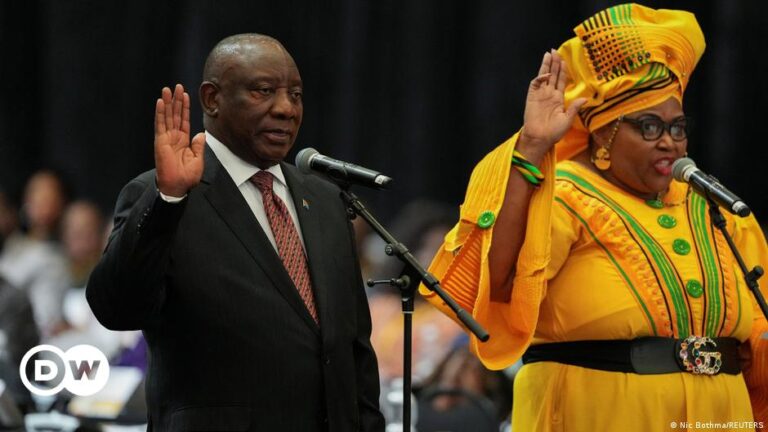South Africa’s newly elected parliament convened in Cape Town after two weeks of intensive behind-the-scenes talks with other parties about a government of national unity.
The day before the National Assembly opened, the ANC announced it had reached a coalition agreement with the opposition Democratic Alliance (DA), popular with white voters, and several other smaller parties.
DA leader John Steenhausen confirmed that the basis for the consensus document was the Constitution and Bill of Rights, which recognise South Africa’s diversity.
President Cyril Ramaphosa’s African National Congress has been weakened after losing its long-held majority in last month’s general election, forcing the president to seek support from other parties.
A new dawn comes
Nearly five years ago, President Ramaphosa delivered his first state of the nation address to Parliament in Cape Town, promising disillusioned South Africans a “new dawn” that would bring economic reform and job creation.
Five years on, the dawn he promised has not come, but now there is a second chance to reboot South Africa, Daniel Silke, an independent political analyst in Cape Town, told DW.
Another political analyst, Assanda Ngoashene, said it was a very interesting arrangement and “it’s not a bad idea in terms of what it allows South Africa to do moving forward.”
Business-friendly government
Ngoashene added that the new system pleases the market and makes sense from an economic perspective. While both parties have liberal-leaning policies, the ANC leans more towards a socialist perspective.
The South African rand strengthened slightly against the dollar following the unity government announcement.
The president stressed the need for a national dialogue and opted for a national unity government with three other parties, including his biggest rival, the pro-business Democratic Alliance, rather than a coalition government.
The conservative Inkatha Freedom Party (IFP) and the right-wing Patriotic Alliance are also in. The DA will hold the post of deputy speaker of parliament.
For Fredson Gyirenge, an analyst at the Rosa Luxembourg Foundation in Johannesburg, the main reason the ANC has proposed a unity government is stability.
“The ANC invited the DA and the IFP into this agreement because we want stability in government, stability in the country,” Gyirenge said. As part of the agreement, the DA said it would support the re-election of President Ramaphosa.
Left-wing populist parties are excluded
The Economic Freedom Fighters (EFF), which came fourth in the election, are trying to persuade black voters in particular to support left-wing populism, while the newly formed MK party (uMkhonto weSizwe), led by former president Jacob Zuma, who was ousted from office by the ANC in 2018, has rejected governing together with the ANC under Ramaphosa.
“If we had formed a coalition with the EFF or MK it would not have worked,” Gyirenge said. “The EFF was seen as a disruptive party and could not give the ANC the credibility it needed to run the government.”
Ngoashene said that for the first time in South African politics there would be an opposition “black bloc” and the ANC would share power with the DA, a predominantly “white” party.
Nelson Mandela’s party, the ANC, which has been in power since the 1994 election that marked the end of apartheid, lost its majority after winning 40% of the vote. The DA came second with 22%, followed by MK with just over 14% and the EFF with around 9%.
A unity government without major parties?
“This looks more like a multiparty government than a government of national unity, as it doesn’t look like the two largest parties, MK and EFF, will be part of a broader new system,” Silke said.
Regarding the balance of parties that could join the new government, Silke believes the ANC’s decision is an opportunity for South Africa to remove certain extremists and build a coalition of more centrist forces that can kick-start economic reform and promote growth and social welfare.
“But the question remains how much disruption this new government system will cause for those who will be excluded,” Silke added.
Forming a government of national unity will require significant support from the participating parties and compromise on ideological issues that are highly divisive, particularly for the ANC and DA.
Will the ANC survive?
Analysts argue a national unity government would provide a platform to overcome racial barriers and focus on common goals such as providing services and building infrastructure.
Corruption has long plagued South African politics, hindering growth, inflating costs and eroding trust. A diverse government offers the opportunity to implement strong anti-corruption policies with greater oversight and cross-party checks.
As the DA battles internal questions about whether it is a good partner for the ANC, it remains to be seen whether the ANC itself can remain united, Silke said.
“These are uncertain times but they are times of potentially dramatic change for South Africa. It’s a new situation for South Africa. Whether it works out or not will depend on the dynamics within the system,” he said.
Gyirenge said it may seem like a success for the ANC that President Ramaphosa has been allowed to stay in power, “but he may not complete his second term,” he added.
Editor: Crispin Mwakidewu

